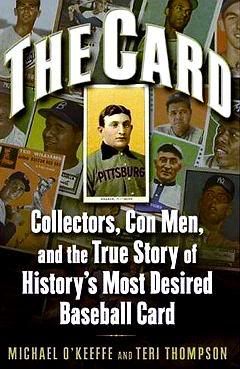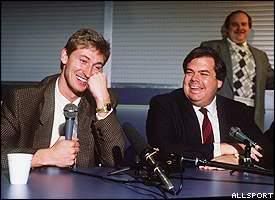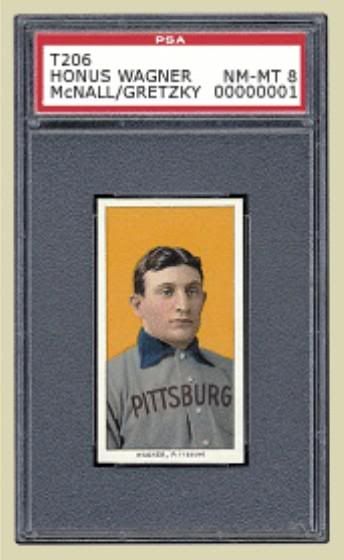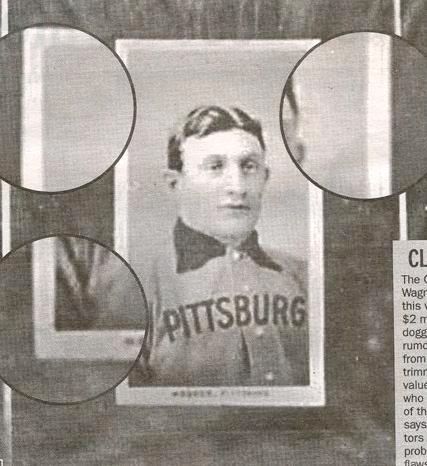I recently had the chance to ask some questions about the hobby to Michael O'Keeffe, New York Daily News sports journalist and co-author of the book The Card which follows the history of the most famous rare baseball card- the Gretzky PSA 8 T206 Honus Wagner.
The book describes many troubling things about the hobby and offers an inside look into the world of authentication and auction houses.
Eric

--------------------------------------------------------------------------------------------------------------------------------------------------------------------------
GAME USED FORUM: Your book The Card follows the history of the highest graded Wagner T206 card. There is the suggestion that somewhere along the way the card was trimmed to get a high grade from PSA. Do you know if it was trimmed by a collector or an auction house?
MICHAEL O'KEEFFE: Teri Thompson and I were told by two sources that Alan Ray, the collector who sold the card to Bill Mastro, and Bob Sevchuk, the memorabilia/card dealer who brokered the sale, cut the card from an intact sheet purchased at a Florida flea market. I don’t know who trimmed it after it left Sevchuk’s Long Island store. But I do believe it was trimmed somewhere between the time Ray sold it and Wayne Gretzky and Bruce McNall bought it.

We recently obtained photos I believe are solid evidence the card was trimmed during that time frame – we published those pictures last month in the Daily News.


--------------------------------------------------------------------------------------------------------------------------------------------------------------------------
GUF: You discussed auction houses doctoring cards. The Game Used Forum discovered a Kellen Winslow “game used” helmet which Mastro Auctions asked the authenticator Lou Lampson to alter. In your opinion, how can consumers know that game used items or baseball cards listed in auction houses are in their original form?
MOK: I don’t really know– cards are especially tough since card doctors have become very sophisticated. I’m certainly no expert on card grading or authentication, so I’m afraid I can’t be of much help here.
But I do think that with game-used memorabilia, people need to educate themselves thoroughly. Don’t take anybody’s word just because they work for a prominent auction house or have a big collection. Use common sense.
Thanks to the Internet, photographs are easy to obtain – and so are opinions from informed collectors and honest dealers. I think the Game Used Forum is a valuable service in that regard.
(The Winslow thread can be found here
http://www.gameuseduniverse.com/vb_f...ead.php?t=8654 )
--------------------------------------------------------------------------------------------------------------------------------------------------------------------------
GUF: In The Card, you touch on conflicts of interest with game used authenticators. What are those conflicts of interest?
MOK: I think one of the biggest is authenticators who write COAs for pieces they own and have consigned to auction, especially when they don’t share that information with consumers. If you were buying a car from a mechanic, you wouldn’t ask him to look it over before you made a decision. Why is it OK for someone to represent himself as an objective authenticator when he’s got a financial stake in the item?
As we report in “The Card,” a lot of authenticators spend literally just a few seconds with a piece before they write COAs. I hear that’s because auction houses want these guys in and out– they don’t want to pay for the extra days it would take to do the job right. The relationship between authenticators/card graders and auction houses is way too cozy.
I also think a lot of these self-proclaimed authenticators don’t have the experience or knowledge necessary to do the job right.
--------------------------------------------------------------------------------------------------------------------------------------------------------------------------
GUF: Are these conflicts of interest illegal or merely unethical?
MOK: I don’t know– I’m not an attorney or a prosecutor. I do consider that kind of behavior unethical. How can you take money from consumers and tell them they’re getting an independent, objective review of a piece of memorabilia when you a) own it or b) spent less than 30 seconds examining it or c) don’t know what you’re doing?
--------------------------------------------------------------------------------------------------------------------------------------------------------------------------
GUF: What is your opinion on the state of the game used hobby?
MOK: I think there are a lot of problems in the hobby and I’m amazed at the amount of crap people are willing to put up with in order to spend thousands of dollars on a card or jersey. I’m amazed at how blatant some of the hucksters in the hobby can be.
--------------------------------------------------------------------------------------------------------------------------------------------------------------------------
GUF: From your experience researching the hobby, what needs to be changed and what needs to be disclosed?
MOK: I think collectors, reputable dealers and honest auction houses need to stand up and say “We’re not gonna take it.” I think that has already begun – Robert Edward Auctions has done a tremendous public service in recent years by openly talking about the hobby’s numerous problems and Rob Lifson should get a lot of credit for that.
The one thing that amazes me is how passive collectors are. You guys know who many of the problem people are – you talk about them all the time on the forum. But you act like getting ripped off comes with the territory, like it’s merely the cost of doing business. Why not boycott those auction houses and authenticators? I hate to break the news to you guys, but we really only need food, water and shelter to survive – you really don’t need a Cal Ripken jersey or a T206 Wagner. If people believe an authenticator is a crook or an incompetent, why keep buying stuff with his COAs? If an auction house misrepresents pieces, why keep buying their stuff?
People should go to the police, the FBI, the Better Business Bureau and their local district attorney if they think they’ve been defrauded. I hear from people in the hobby all the time who want me to do a story because they got ripped off. When I ask them if they reported it to the cops, nine times out of 10 they say no. Maybe law enforcement won’t be interested; maybe they will tell you this is a civil dispute. But you won’t know until you try, and if the authorities hear enough complaints, they may be moved to act.
I don’t think things will ever change until the problem people go out of business, go to jail or are hit with big fines.
--------------------------------------------------------------------------------------------------------------------------------------------------------------------------
GUF: What did you learn about the sports memorabilia hobby from your work researching The Card?
MOK: It was fun to learn about the history of cards and about Honus Wagner. It was great to go deep on a subject I’d written about in the past.
--------------------------------------------------------------------------------------------------------------------------------------------------------------------------
GUF: You expose some questionable practices in The Card. Have you had any response from the parties involved?
MOK: There was some saber-rattling from some lawyers before the book was published, but that’s it.
--------------------------------------------------------------------------------------------------------------------------------------------------------------------------
GUF: You do a lot of investigative work on the sports memorabilia hobby for the New York Daily News. Anything you're working on that we should look for?
MOK: I’m juggling a few things right now but I don’t know if they will pan out as stories so I better not say. I am curious about the rest of the press when it comes to sports memorabilia. How come the hobby publications (with some notable exceptions) are such pansies when it comes to asking the tough questions? Why do people buy these magazines that are little more than advertising flyers?
--------------------------------------------------------------------------------------------------------------------------------------------------------------------------
The Card: Collectors, Con Men, and the True Story of History's Most Desired Baseball Card by Michael O'Keeffe and Teri Thompson is on sale at Amazon.com for $18.96
The book describes many troubling things about the hobby and offers an inside look into the world of authentication and auction houses.
Eric

--------------------------------------------------------------------------------------------------------------------------------------------------------------------------
GAME USED FORUM: Your book The Card follows the history of the highest graded Wagner T206 card. There is the suggestion that somewhere along the way the card was trimmed to get a high grade from PSA. Do you know if it was trimmed by a collector or an auction house?
MICHAEL O'KEEFFE: Teri Thompson and I were told by two sources that Alan Ray, the collector who sold the card to Bill Mastro, and Bob Sevchuk, the memorabilia/card dealer who brokered the sale, cut the card from an intact sheet purchased at a Florida flea market. I don’t know who trimmed it after it left Sevchuk’s Long Island store. But I do believe it was trimmed somewhere between the time Ray sold it and Wayne Gretzky and Bruce McNall bought it.

We recently obtained photos I believe are solid evidence the card was trimmed during that time frame – we published those pictures last month in the Daily News.


--------------------------------------------------------------------------------------------------------------------------------------------------------------------------
GUF: You discussed auction houses doctoring cards. The Game Used Forum discovered a Kellen Winslow “game used” helmet which Mastro Auctions asked the authenticator Lou Lampson to alter. In your opinion, how can consumers know that game used items or baseball cards listed in auction houses are in their original form?
MOK: I don’t really know– cards are especially tough since card doctors have become very sophisticated. I’m certainly no expert on card grading or authentication, so I’m afraid I can’t be of much help here.
But I do think that with game-used memorabilia, people need to educate themselves thoroughly. Don’t take anybody’s word just because they work for a prominent auction house or have a big collection. Use common sense.
Thanks to the Internet, photographs are easy to obtain – and so are opinions from informed collectors and honest dealers. I think the Game Used Forum is a valuable service in that regard.
(The Winslow thread can be found here
http://www.gameuseduniverse.com/vb_f...ead.php?t=8654 )
--------------------------------------------------------------------------------------------------------------------------------------------------------------------------
GUF: In The Card, you touch on conflicts of interest with game used authenticators. What are those conflicts of interest?
MOK: I think one of the biggest is authenticators who write COAs for pieces they own and have consigned to auction, especially when they don’t share that information with consumers. If you were buying a car from a mechanic, you wouldn’t ask him to look it over before you made a decision. Why is it OK for someone to represent himself as an objective authenticator when he’s got a financial stake in the item?
As we report in “The Card,” a lot of authenticators spend literally just a few seconds with a piece before they write COAs. I hear that’s because auction houses want these guys in and out– they don’t want to pay for the extra days it would take to do the job right. The relationship between authenticators/card graders and auction houses is way too cozy.
I also think a lot of these self-proclaimed authenticators don’t have the experience or knowledge necessary to do the job right.
--------------------------------------------------------------------------------------------------------------------------------------------------------------------------
GUF: Are these conflicts of interest illegal or merely unethical?
MOK: I don’t know– I’m not an attorney or a prosecutor. I do consider that kind of behavior unethical. How can you take money from consumers and tell them they’re getting an independent, objective review of a piece of memorabilia when you a) own it or b) spent less than 30 seconds examining it or c) don’t know what you’re doing?
--------------------------------------------------------------------------------------------------------------------------------------------------------------------------
GUF: What is your opinion on the state of the game used hobby?
MOK: I think there are a lot of problems in the hobby and I’m amazed at the amount of crap people are willing to put up with in order to spend thousands of dollars on a card or jersey. I’m amazed at how blatant some of the hucksters in the hobby can be.
--------------------------------------------------------------------------------------------------------------------------------------------------------------------------
GUF: From your experience researching the hobby, what needs to be changed and what needs to be disclosed?
MOK: I think collectors, reputable dealers and honest auction houses need to stand up and say “We’re not gonna take it.” I think that has already begun – Robert Edward Auctions has done a tremendous public service in recent years by openly talking about the hobby’s numerous problems and Rob Lifson should get a lot of credit for that.
The one thing that amazes me is how passive collectors are. You guys know who many of the problem people are – you talk about them all the time on the forum. But you act like getting ripped off comes with the territory, like it’s merely the cost of doing business. Why not boycott those auction houses and authenticators? I hate to break the news to you guys, but we really only need food, water and shelter to survive – you really don’t need a Cal Ripken jersey or a T206 Wagner. If people believe an authenticator is a crook or an incompetent, why keep buying stuff with his COAs? If an auction house misrepresents pieces, why keep buying their stuff?
People should go to the police, the FBI, the Better Business Bureau and their local district attorney if they think they’ve been defrauded. I hear from people in the hobby all the time who want me to do a story because they got ripped off. When I ask them if they reported it to the cops, nine times out of 10 they say no. Maybe law enforcement won’t be interested; maybe they will tell you this is a civil dispute. But you won’t know until you try, and if the authorities hear enough complaints, they may be moved to act.
I don’t think things will ever change until the problem people go out of business, go to jail or are hit with big fines.
--------------------------------------------------------------------------------------------------------------------------------------------------------------------------
GUF: What did you learn about the sports memorabilia hobby from your work researching The Card?
MOK: It was fun to learn about the history of cards and about Honus Wagner. It was great to go deep on a subject I’d written about in the past.
--------------------------------------------------------------------------------------------------------------------------------------------------------------------------
GUF: You expose some questionable practices in The Card. Have you had any response from the parties involved?
MOK: There was some saber-rattling from some lawyers before the book was published, but that’s it.
--------------------------------------------------------------------------------------------------------------------------------------------------------------------------
GUF: You do a lot of investigative work on the sports memorabilia hobby for the New York Daily News. Anything you're working on that we should look for?
MOK: I’m juggling a few things right now but I don’t know if they will pan out as stories so I better not say. I am curious about the rest of the press when it comes to sports memorabilia. How come the hobby publications (with some notable exceptions) are such pansies when it comes to asking the tough questions? Why do people buy these magazines that are little more than advertising flyers?
--------------------------------------------------------------------------------------------------------------------------------------------------------------------------
The Card: Collectors, Con Men, and the True Story of History's Most Desired Baseball Card by Michael O'Keeffe and Teri Thompson is on sale at Amazon.com for $18.96

Comment